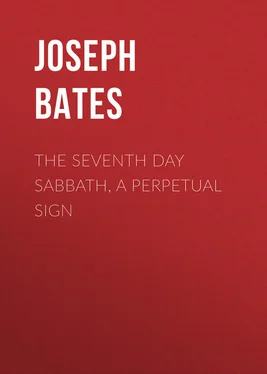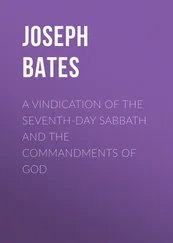Joseph Bates - The Seventh Day Sabbath, a Perpetual Sign
Здесь есть возможность читать онлайн «Joseph Bates - The Seventh Day Sabbath, a Perpetual Sign» — ознакомительный отрывок электронной книги совершенно бесплатно, а после прочтения отрывка купить полную версию. В некоторых случаях можно слушать аудио, скачать через торрент в формате fb2 и присутствует краткое содержание. ISBN: , Жанр: foreign_antique, foreign_prose, на английском языке. Описание произведения, (предисловие) а так же отзывы посетителей доступны на портале библиотеки ЛибКат.
- Название:The Seventh Day Sabbath, a Perpetual Sign
- Автор:
- Жанр:
- Год:неизвестен
- ISBN:http://www.gutenberg.org/ebooks/27266
- Рейтинг книги:4 / 5. Голосов: 1
-
Избранное:Добавить в избранное
- Отзывы:
-
Ваша оценка:
- 80
- 1
- 2
- 3
- 4
- 5
The Seventh Day Sabbath, a Perpetual Sign: краткое содержание, описание и аннотация
Предлагаем к чтению аннотацию, описание, краткое содержание или предисловие (зависит от того, что написал сам автор книги «The Seventh Day Sabbath, a Perpetual Sign»). Если вы не нашли необходимую информацию о книге — напишите в комментариях, мы постараемся отыскать её.
The Seventh Day Sabbath, a Perpetual Sign — читать онлайн ознакомительный отрывок
Ниже представлен текст книги, разбитый по страницам. Система сохранения места последней прочитанной страницы, позволяет с удобством читать онлайн бесплатно книгу «The Seventh Day Sabbath, a Perpetual Sign», без необходимости каждый раз заново искать на чём Вы остановились. Поставьте закладку, и сможете в любой момент перейти на страницу, на которой закончили чтение.
Интервал:
Закладка:
Once more; think you that the spirit of God ever directed Moses when he was giving the history of the creation of the world, to write that he (God) "blessed the seventh day and sanctified it, because that in it he had rested from all his work." unless he meant it to be dated from that very day? Why, this is as clear to the unbiassed mind as it is that God created man the sixth day. Would it not be the height of absurdity to attempt to prove that God only intended Adam should be created at some future period, or that the creation of the heavens and earth was not in the beginning, but some twenty five hundred years afterwards? All this would be as cogent reasoning as it would be to argue that God did not intend this day of rest should commence until about twenty-five hundred years afterwards. (The word Sabbath signifies rest.)
It follows then irresistibly, that the weekly Sabbath was not made for the Jews only, (but as Jesus says, for 'man') for the Jews had no existence until more than two thousand years after it was established. President Humphrey in his essays on the Sabbath says, "That he (God) instituted it when he rested from all his work, on the seventh day of the first week, and gave it primarily to our first parents, and through them to all their posterity; that the observance of it was enjoined upon the children of Israel soon after they left Egypt, not in the form of a new enactment, but as an ancient institution which was far from being forgotten, though it had doubtless been greatly neglected under the cruel domination of their heathen masters; that it was re-enacted with great pomp and solemnity, and written in stone by the finger of God at Sinai; that the sacred institution then took the form of a statute, with explicit prohibitions and requirements, and has never been repealed or altered since; that it can never expire of itself, because it has no limitation."
In Deut. vii: 6-8, God gives his reasons for selecting the Jews to keep his covenant in preference to any other nation; only seventy at first – x: 22. God calls it his "Sabbath," and refers us right back to the creation for proof. "For in six days the Lord made heaven and earth and sea, and all that in them is, and rested on the seventh ," &c. Here then we stand fixed by the immutable law of God, and the word of Jesus, that "the Sabbath was made for man!" Paul says, "there is no respect of persons with God." Rom. ii: 11. Isaiah shows us plainly that the Jew is not the only one to be blessed for keeping the Sabbath. He says "Blessed is the man (are not the Gentiles men?) that keepeth the Sabbath from polluting it." "Also the sons of the stranger, (who are these if they are not Gentiles?) every one that keepeth the Sabbath from polluting it, (does he mean me? yes, every gentile in the universe, or else he respects persons) even them will I bring to my holy mountain and make them joyful in my house of prayer; for my house shall be called an house of prayer for all people." Isa. lvi: 2, 6, 7. If this promise is not to the Gentile as well as the Jew, then " the house of prayer for all people" is no promise to the Gentile.
Now we ask, if God has ever abrogated the law of the Sabbath? If he has it can easily be found. We undertake to say without fear of contradiction, he has not made any such record in the bible; but on the contrary, he calls it a perpetual covenant, a "sign between me and the children of Israel forever," for the reason that he rested on the seventh day, Exo. xxxi: 16, 17. Says one, has not the ceremonial law been annulled and nailed to the cross? Yes, but what of that? Why then the Sabbath must be abolished, for Paul says so! Where? Why in Cols. 2d chapter, and xiv. Romans. How can you think that God ever inspired Paul to say that the seventh day Sabbath was made void or nailed to the cross at the crucifixion, when he never intended any such change; if he did, he certainly would have deceived the inhabitants of Jerusalem, in the promise which he made them about two thousand four hundred and forty-six years ago! Turn now to Jer. xvii: 25, and tell me if he did not promise the inhabitants of Jerusalem that their city should remain forever if they would hallow the sabbath day. Now suppose the inhabitants of Jerusalem had entered into this agreement, and entailed it upon their posterity (because you see it could not have been fulfilled unless it had continued from generation to generation,) to keep the Sabbath holy, would not God have been bound to let Jerusalem remain forever? You say yes. Well, then, I ask you to show how he could have kept that promise inviolate if he intended in less than six hundred and fifty years to change this seventh day Sabbath, and call the first day of the week the Sabbath, or abolish it altogether? I say, therefore, if there has been any change one way or the other in the Sabbath, since that promise, it would be impossible to understand any other promise in the Bible; how much more reasonable to believe God than man. If men will allow themselves to believe the monstrous absurdity that forever, as in this promise, ended at the resurrection, then they can easily believe that the Sabbath was changed from the seventh to the first day of the week. Or if they choose the other extreme, abolished until the people of God should awake to be clothed on with immortality. Heb. iv: 9.
Now does it not appear plain that the Sabbath is from God, and that it is coeval and co-extensive (as is the institution of marriage) with the world. That it is without limitation; that there is not one thus saith the Lord that it ever was or ever will be abolished, in time or eternity. – See Exod. xxxi: 16, 17; and Isa. lxvi: 22, 24; Heb iv: 4, 9. But let us return and look at the subject as we have commenced in the light of Paul's argument to the Romans and Collossians, for here is where all writers on this subject, for the change or the overthrow of the seventh day Sabbath attempt to draw their strong arguments. The second question then, is this:
Has the Sabbath been abolished since the seventhday of Creation? If so, when, and where is the proof?
The text already referred to, is in Rom. xiv: 5, 6. – "One man esteemeth one day above another: another esteemeth every day alike. Let every man be persuaded in his own mind. He that regardeth the day, regardeth it unto the Lord; and he that regardeth not the day to the Lord, he doth not regard it." Does the apostle here mean to say, that under the new or Christian dispensation it is a matter of indifference which day of the week is kept as a Sabbath, or whether any sabbath at all is kept? Was that institution which the people of God had been commanded to call a delight, the holy of the Lord, honorable, now to be esteemed of so carnal a nature as to be ranked among the things which Jesus "took out of the way, nailing it to his cross." If this be true, then has Jesus, in the same manner, abolished the eight last verses in the fifty-eighth of Isaiah, and the 2d, 6th and 7th verses of the 56th chapter have no reference to the Gentile since the crucifixion. O Lord help us rightly to understand and divide thy word. But is it not evident from the four first verses in the same chapter of Romans, that Paul is speaking of feast days; Hear him explain. "Destroy not him with thy meat for whom Christ died. For the kingdom of God is not meat and drink." 15, 17 v, also 20, 23. Giving them again in substance the decrees which had been given by the Apostles in their first conference, in A. D. 51; held at Jerusalem. See Acts xv: 19. James proposes their letter to the Gentiles should be "that they abstain from pollution of Idols, and from fornication, and from things strangled, and from blood;" to which the conference all agreed. Now please read their unanimous decrees (xvi: 4,) from twenty-three to thirty verses. "For it seemed good to the Holy Ghost and to us, to lay upon you no greater burden than these necessary things." "That ye abstain from meats offered to Idols, and from blood, and from things strangled, and from fornication, from which if ye keep yourselves ye shall do well." Reading along to the 13th of the next chapter, we find Paul establishing the Churches with these decrees; (see 4, 5,) and at Philippi he holds his meeting, (not in the Jews Synagogue) but at the river's side, on the Sabbath day. A little from this it is said that Paul is in Thesalonica preaching on the Sabbath days. Luke says this was his manner . What was it? Why, to preach on the Sabbath days (not 1st days.) Observe here were three Sabbaths in succession. xvii: 2. A little while from this Paul locates himself in Corinth, and there preaches to the Jews and Greeks (or Gentiles) a year and six months every Sabbath . Now this must have been seventy-eight in succession. xviii: 4, 11. Does this look like abolishing the Sabbath day? Has anything been said about the 1st day yet? No, we shall speak of that by and by.
Читать дальшеИнтервал:
Закладка:
Похожие книги на «The Seventh Day Sabbath, a Perpetual Sign»
Представляем Вашему вниманию похожие книги на «The Seventh Day Sabbath, a Perpetual Sign» списком для выбора. Мы отобрали схожую по названию и смыслу литературу в надежде предоставить читателям больше вариантов отыскать новые, интересные, ещё непрочитанные произведения.
Обсуждение, отзывы о книге «The Seventh Day Sabbath, a Perpetual Sign» и просто собственные мнения читателей. Оставьте ваши комментарии, напишите, что Вы думаете о произведении, его смысле или главных героях. Укажите что конкретно понравилось, а что нет, и почему Вы так считаете.











